Between its gorgeous presentation and sentimental script, Please Be Happy might just be the most uplifting and heartfelt story I've taken in all year, full stop.
Quick View
- Release Date: November 21, 2022
- Developer: Studio Élan
- Price: $19.99
- Suggested Audience Age: All Ages
- Estimated Time to Complete: 12 hours for one ending, 20 hours for all four, depending on your reading speed.
- Availability: Steam and itch.io, with console ports on the way in 2023
- Recommended for fans of: Cozy slice-of-life stories, heartfelt LGBTQ+ fiction, and earnest indie darlings.
Geek to Geek Media was provided with a review copy of this title.
Right from the beginning, Please Be Happy was always a story aimed straight up my alley.
I love a sort of “familiar fantasy“, those with a sense of lived-in “worldliness” that feels oh-so-enriched by an injection of imagination.
I adore slice-of-life fiction, and all the truisms that they wrap up in a blanket of sacccharine optimism.
I'm even admittedly biased toward Studio Élan's work in general. Their Highway Blossoms wa s a shoot-from-the-hip favorite in the Racial Justice and Equality Bundle two years back – and I've had a soft spot for their art and writing projects since.
But between all that, I genuinely mean it when I say that Please Be Happy might just be the most uplifting and heartfelt story I've taken in all year, full stop.
Please Feel Welcome
The back-of-the-box synopsis of Please Be Happy is that Miho, a vagabond fox spirit, finds herself in New Zealand. Among the dryads and mermaids and humans of a casually urban-fantasy Wellington, her habitual thievery crosses her path with that of Aspen, an aspiring novelist; and Juliet, a vampiric library-owner. But rather than landing in hot water, she's confronted with a compassionate offer: to start over.
It can seem a bit too convenient: that she should get off scot-free for red-handed burglary, fall in with two exceptionally open-minded people, and be all-but-adopted on blind faith. But each of those come with a hook. That her forgiveness comes out of another's grief. Her new friendships have a colossal asterisk attached. And domestic life makes her social naivete distressingly apparent.
As much as I can talk about any of these, the story's main folkloreish concern is a sort of curse on Miho; that anyone who meets her will forget her after a full day apart.
But rather than maintain their distance or set off on some spell-busting adventure, the cast kints itself together ever-tighter. It's a neat little fable-like reason for Miho to grow close to people for the first time in decades – first reluctantly, then whole-heartedly.
And here's the thing – the “curse” works just as well to shine a light on her neighbors' sheer kindliness. Sure, the hyperactive Lena or jolly Mr. Kim always meet Miho like a stranger. But day after day, it's always with open arms. Given dozens of first impressions, each of them chooses to greet her as a new friend, every time.
And that's a mission statement for Please Be Happy : that people, at their core, want to do right by each other.
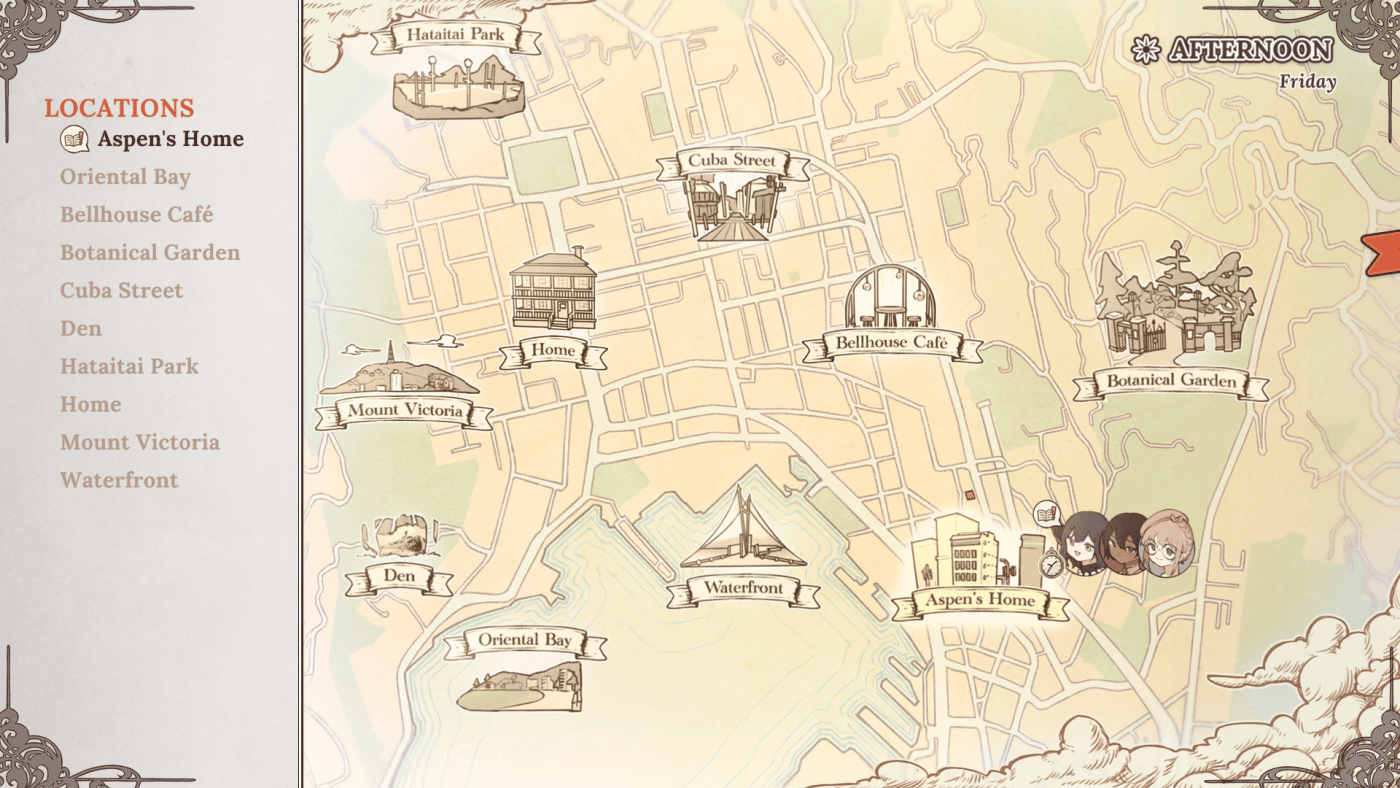
Please Enjoy the View
The art in Please Be Happy is front-and-center as a main attraction, showcasing straight away how well its character art blends into the Wellington set-dressing. And from that point on, everywhere you look, Please Be Happy goes beyond normal expectations to make its story a visual treat as much as a moral salve.
Everyone is rich with expressive tics, from the narrowing of an eye to the twitch of a fluffy ear. They're fully-voiced with animated mouths – something that can look awkward on flat illustrations, but is done carefully here so as not to break their illusion. And just a bit of moody lighting on each scene contributes so much to its atmostphere that I'm astounded more visual novels haven't done the same.
Most noticably, the game separates its dialogue boxes from its narrative text, leaving the latter in a shadowbox across the bottom of the screen. The game plays around with this positioning in a few spots to frame its vignettes, but the overall benefit is perfect graphic-novel-like clarity. It's always apparent exactly who's speaking and what they're responding to, and virtually no confusion as to whether a thought is verbalized or left to Miho's inner monologue.
These all sound like small things, written out like this. But just like a different lens or the hour of the day can completely change a photograph, that extra effort put into framing does oh-so-much to make the story sing.
To give a clear example: Studio Élan has always made a point of witing protagonists as active and endearing as their more outgoing companions. But between her centuries' worth of defined personality and occasional childlike misgivings, Miho's expressive energy shines through their sense of presentation:
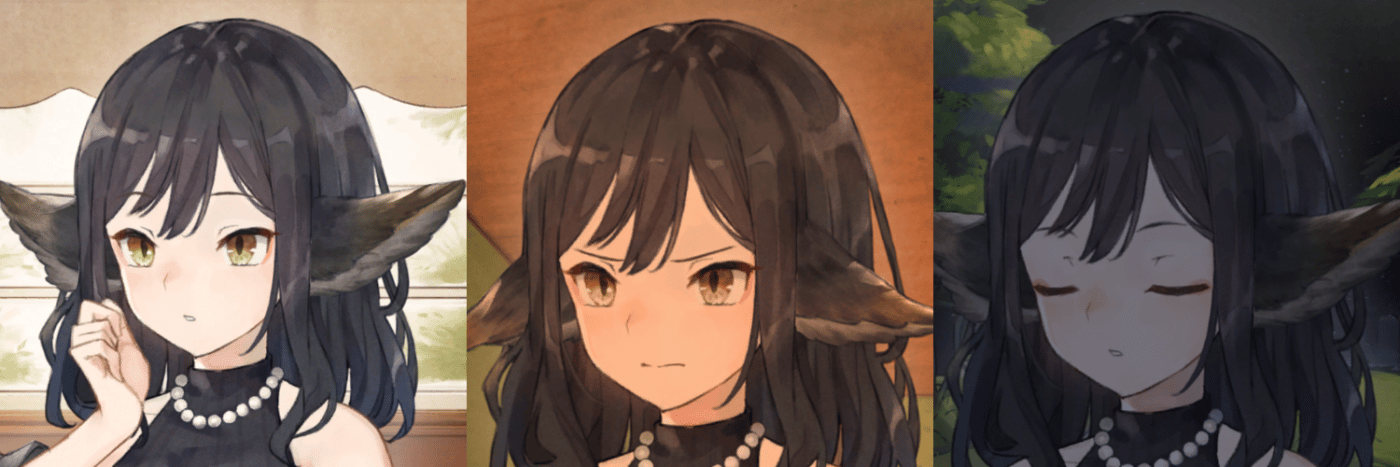
Please Pardon the Hiccups
Unfortunately, a few of Please Be Happy‘s pain points are also a few of those that most stand out about a visual novel. Every once in a while, a line of diaoluge will differ just a bit between its spoken and written versions, or the way it's performed won't quite match the context. In a rare case, I found a bit of text incorrectly split across two lines, which was jarring enough to make me stop entirely.
To Élan's credit, they've already fixed some of these technical issues between the game's release and my writing this review. But the few outliers in performance are the kind of things that seem hard to iron out with a quick patch.
But when I call out these bugbears, they only stand out the more because they represent the game getting in its own way. It's a shame, since the text and acting are the core of how a visual novel gets across. When everything else about this story is going so right, it's always a shame to have the flow of the story grind to a halt when my brain trips over some questionable inflection or editing hiccup.
Don't let that throw you off the story entirely, mind. Most of the time, it's just peachy:
Please Have Hope
I can't stay too down on the game, because the impression that I take away from Please Be Happy isn't far off from other stories with a magic fox or a friendly version of a classic monster. Its framing is classic – almost timeless in its own way – and the game's calm piano- and string-forward soudtrack give it that gentle feel of a story meant to lift you up and encourage you before all else.
There's drama and heartbreak along the way, sure. But at the end, it's always looking upward, toward affirmation for both the reader and the characters.
It's built into the game's very structure. Visual novels tend to conclude in “good” or “bad” endings – the former usually leading to a romantic outcome, and the latter death or estrangement. But in Please Be Happy, those endings are self-described as “Wild” and “Comfy”.
Two equally valid ways to live, and equally valid goals to strive for. And a small reflection of even more valid ways for these people to come together.
Please Be Happy is a story about love in all its forms. Romantic love, yes, if you'd like. But also the reliablity of healthy, supportive friendships. The close and persevering love that families can hold for each other. Blind, casual empathy is its own form of love. And, if done for the right reasons, rejection can be, too.
You'll find every one of them here, and they're all core to what makes Please Be Happy so moving.
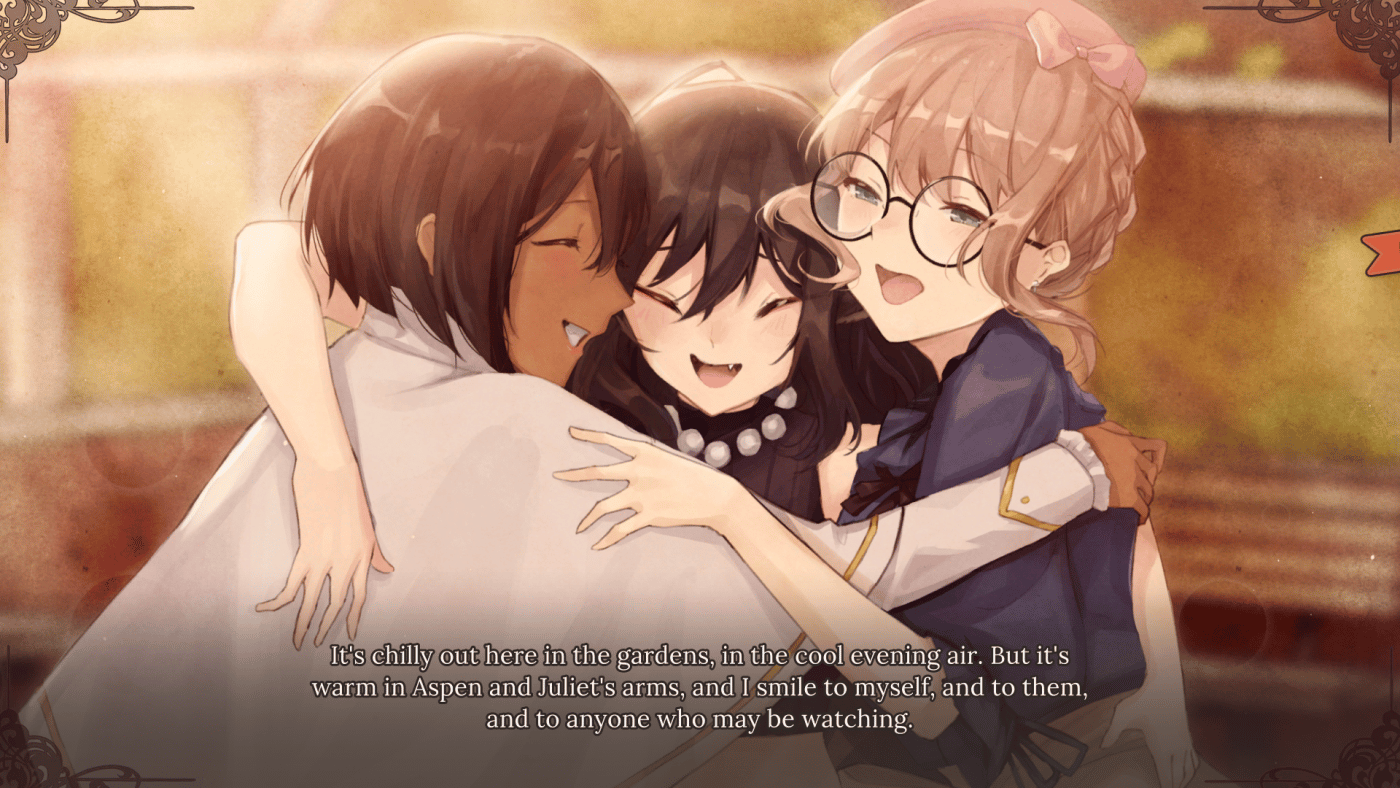
Please Read Please Be Happy
I recognize that this won't be everyone's exact cup of tea. Visual novels as a whole can be hard to sit through for too many hours at a time. Slice-of-life stories even more so, since they explicitly thrive on exploring the mundane and intimate, small-stakes stories. And Please Be Happy, despite not being overly-long, maintains that feel of a slow burn.
But I encourage you to give Please Be Happy a try if it sounds remotely appealing. I always looked forward to sitting down with it, be it to pull through a dark spot in the story or to snack on a few little anecdotes with the Wellington townsfolk. It's so well-presented and its characters so charming that, even with a rough spot here or there, it always left me feeling a bit better than it found me.
It's the delightful everyday, the patient companion, and the warm security of home.
If you ever need a cozy story to curl up with, reach for this one.

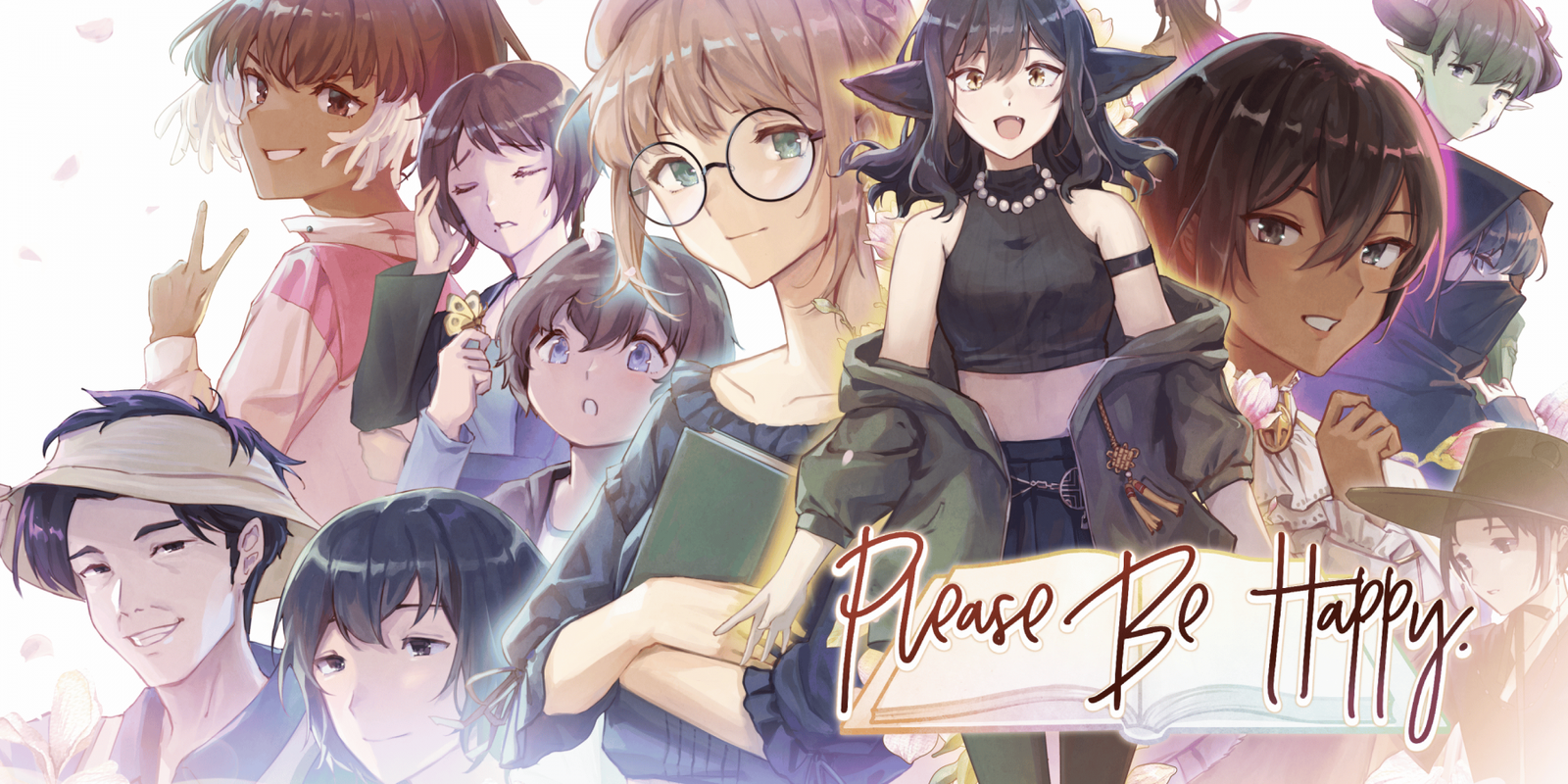
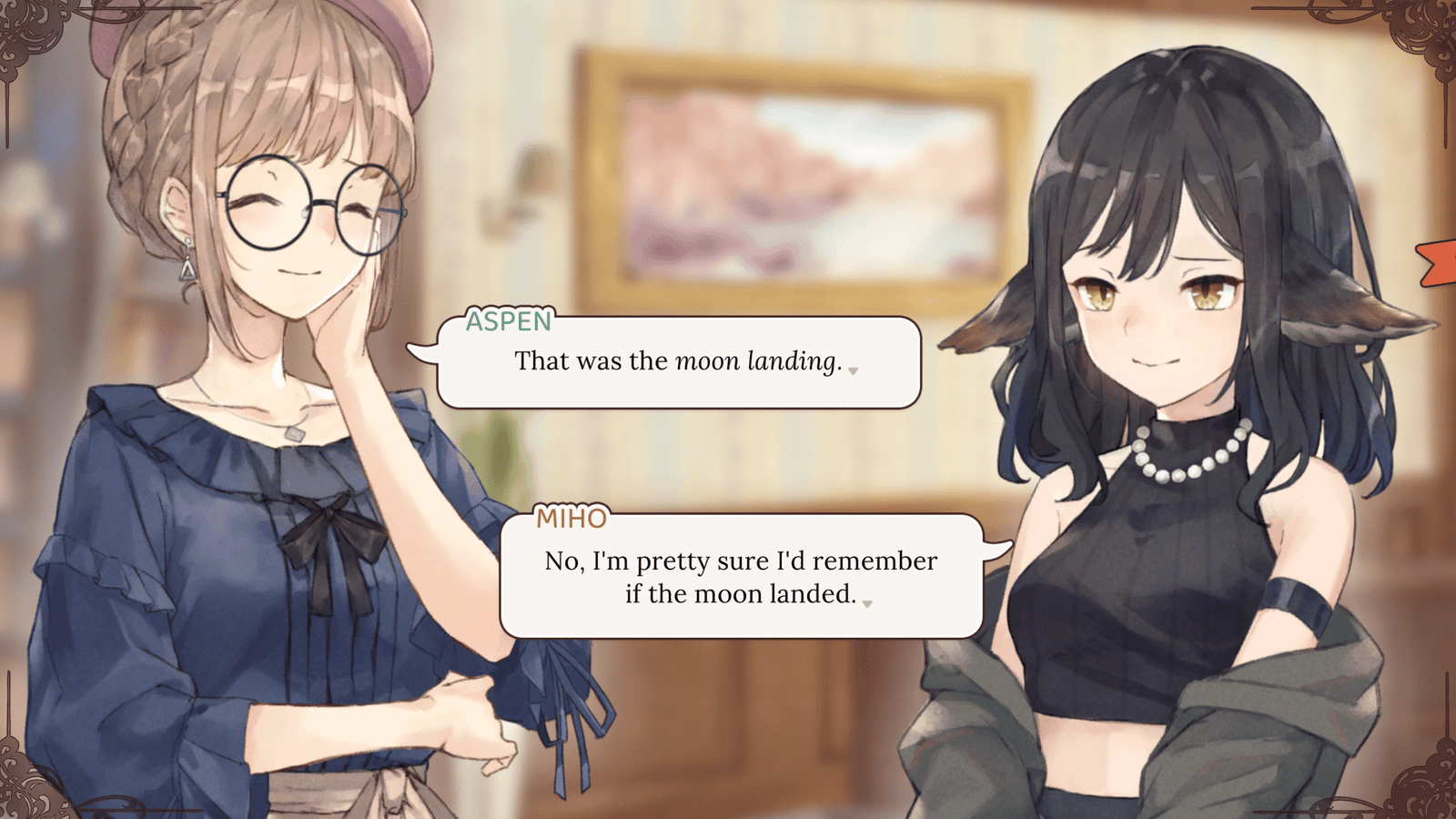
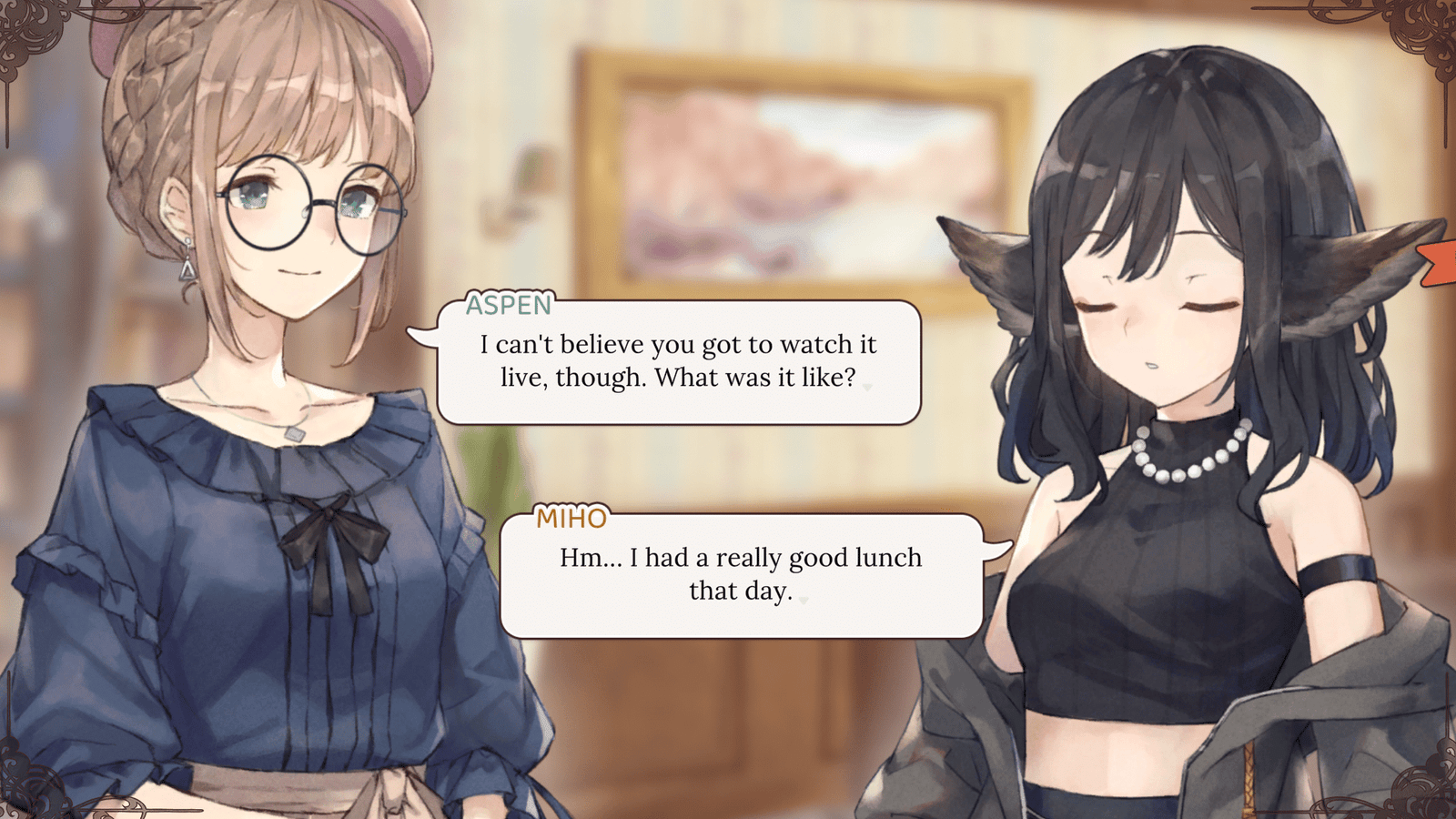
[…] And key dialogue zooms in on sets of talking heads that feel like even more emotive than the visual novels or Tales of series games that they draw comparison […]